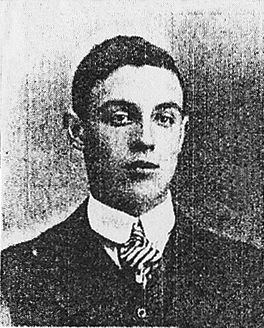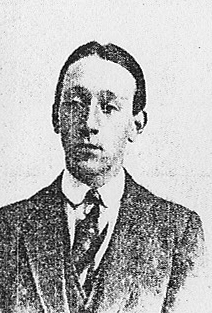
The Wireless World
With which is incorporated "The Marconigraph,"
The following feature is reproduced from The
Wireless World, an illustrated magazine for all those interested in
wireless telegraphy, which was published
monthly by Wireless Press Ltd.
Maritime Wireless Telegraphy
It was not to be expected that our naval tactics against Germany would be accomplished without our suffering some loss, but the mishap which happened to H.M. hospital ship Rohilla was additionally unfortunate in that it interfered with the noble work of bringing relief to our suffering soldiers.
The Rohilla was on its way from the Firth of Forth to Dunkirk to take part in the shipment of wounded to England when she ran aground off St. Abbs Head and became a total wreck. The vessel was a twin-screw steamer of 7,400 gross tons, and had been chartered for its purposes by the Government from the British India Steam Navigation Co. Ltd. Luckily the vessel was on the outward journey; had she been homeward bound with her full complement of wounded the loss of life must have been infinitely greater. As it was some 30 lives were lost, or so it must be presumed, for the exact list has not yet been published. There were two Marconi operators onboard the vessel; Senior Operator Robert T. Utting and Junior Operator Wilson.
* * *
At the time of the accident (4.15 a.m., Friday, October 30th) there was a very heavy beam sea running, and the position of the vessel was perilous in the extreme. Immediately S.O.S., signals were, sent out, and answer was received from the Cullercoats coast station. No vessels were near enough to assist, and, as under the present conditions of martial law no mercantile vessel may possess a working wireless apparatus in home waters, it was impossible to reach those out of signalling range.
Nevertheless all that could be done was done; news was sent, from Cullercoats to Whitby, and there the lifeboat was put out, but the seas were so heavy that the craft could not face them. Finally, however, the boat was taken across the harbour and then made her way through the outlet between the East Pier and the cliffs to the doomed vessel. She successfully accomplished two journeys, and brought about thirty people ashore, including all the nurses and some, of the doctors. Already the shore people were awakened by the booming of the Rohilla's guns. Rocket apparatus was secured, and attempts were made to fire a line across to the wreck, but despite every effort nothing could be done. Finally, Captain Neilson of the Rohilla despatched one of his boats with a line to establish communication with the shore, but the breakers did not allow of sufficient line to be paid out, and the boat's crew were at length forced to cut it to prevent themselves from being swamped. Many of the crew of the Rohilla were by this time taking shelter in the wireless cabin which was situated on the deck.
Most of them were clad only in the scantiest attire, and were glad to accept the operator’s offer of spare clothes. It was well they did so, for they had not been long in shelter when the wireless room became untenable owing to the tremendous seas on the port side, until at last one gigantic wave swept the whole cabin, together with the wireless plant, away.
* * *
Almost as soon as the Rohilla had struck the rock the dynamos of the ship had ceased to work, and the wireless operator was forced to make use of the emergency set, which worked very well until the heavy sea destroyed everything. About 8.30 the vessel broke in two, and by this time the Whitby lifeboat had been put out of action, for a large hole had stove in the bottom, Cullercoats had fortunately sent messages to Scarborough, Middlesbrough and West Hartlepool to send tugs and lifeboats, and a little later motor lifeboats from Southgare and Redcar were also requisitioned. Throughout the whole time a gale was blowing furiously, the force of the wind being estimated at about 70 knots per hour.
The shore people now attempted a splendid piece of rescue work. The Upgang lifeboat was brought to the sea by road and lowered down over the cliff from a height of 200 ft, but despite every effort it was impossible to launch it owing to the tremendous breakers. Captain Neilson and the remainder of the crew were by this time in a perilous condition. Nevertheless, all through Friday night they clung to the wreck, but when Saturday morning broke, and the sea had somewhat unabated, Captain Neilson gave the order that all who could should attempt to swim to shore. The distance was only some 700 yards, but the surf made the task one of the greatest dangers. About fifty men attempted the journey, and forty of these reached land in an exhausted condition; amongst them was Junior Operator Wilson.
At 10 o'clock the Scarborough lifeboat arrived, towed by a steam trawler, but nothing could be done, so the captain signalled to shore, "Have ambulance parties ready tonight at low water. All leaving ship on rafts. She cannot last out much longer." All hands were set to work to construct these rafts, using any material available from the captain's bridge and the cabin. Just as the final plunge was about to be made the wind freshened and the sea rolled up more threateningly than ever. The captain countermanded his order to float the rafts, and decided that while anything remained of the vessel it was more expedient to stay where they were than trust themselves to the elements, Nevertheless, thirteen sought and obtained permission to attempt to get off, but only three of them reached shore. The chief officer was one of them.
* * *
About midnight on Saturday a powerful searchlight arrived from Newcastle by special train, and was immediately set working. This gave great heart to the shipwrecked men as it lit up the chart room, where all were huddled together, soaked to the skin, cold and hungry the majority of them had tasted neither food nor drink since the Thursday evening. On Sunday morning the South Shields lifeboat was seen making its way to the wreck. After a tremendous struggle it succeeded in coming alongside the Rohilla, pouring oil on the sea, and the gallant crew by almost superhuman efforts succeeded in taking off the fifty survivors.
It was with this last shipload that Senior Operator Utting left the vessel. He describes the behaviour of all concerned in the disaster as beyond praise. In the face of imminent danger not a grumble (nor so much as a whisper of fear was heard.) The men who possessed tobacco shared it with their comrades, and the leaves of some magazines found in the chart room were used to improvise cigarette paper. Those who had pipes in their possession filled them, took a whiff and handed the treasure to the next man, who likewise took a whiff, and so the pipe of good comradeship was passed round. The readers of THE WIRELESS WORLD will rejoice with us in the safe return of the two Marconi operators. Had they been called upon to lay down their lives, as some of their comrades have already done in the service of the country, we doubt not that they would have done so like men, and that there would have been others willing, nay eager, to face the same danger and take the same risks as themselves. But we are thankful that this last obligation was not required of the Marconi operators on the Rohilla, for however many there may be to take their place the Service cannot afford to lose any one of her "good men and true."
From the Faraday House Journal we note with interest that the Old Faradians who are engineers in the service of the Marconi Company are very enthusiastic about their work, and we also notice with interest that the Carnarvon station has made an impression upon a writer in the Journal who remarks that "from the tops of most of the mountains in North Wales wireless posts make excellent landmarks for fixing the geographical positions of the various mountains, lakes, islands, etc., which can be seen in the distance."
 |
 |
Robert T. Utting |
Frederick Edwin Wilson |
The Rohilla's
Marconi Operators |
|
The Wireless World feature contains some inaccuracies but given the way in which news was reported around the globe it is to be accepted that reports of the ships loss do so.
Copyright © Colin Brittain 1999 - 2014